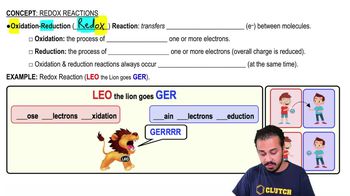Explain how feedback inhibition regulates metabolic pathways.
Biologists often use the term 'energy source' as a synonym for 'electron donor.' Why?
 Verified step by step guidance
Verified step by step guidance
Verified Solution
Key Concepts
Energy Source

Electron Donor

Redox Reactions

Evaluate these statements about Koch's postulates, which are used to establish a causative link between a specific microbe and a specific disease. Select True or False for each statement. T/F The microbe must be present in individuals suffering from the disease and absent from healthy individuals. T/F The microbe must be isolated and grown in pure culture. T/F If organisms from the pure culture are injected into a healthy experimental animal, the disease symptoms should appear. T/F The microbe does not have to be isolated from the experimental animal as long as the disease is present.
What has metagenomic analysis allowed researchers to do for the first time? a. sample organisms from an environment and grow them under defined conditions in the lab b. isolate organisms from an environment and sequence their entire genome c. study organisms that cannot be cultured (grown in the lab) d. identify important morphological differences among species
Using what you have learned about changes in Gibbs free energy, would you predict the ∆G value of catabolic reactions to be positive or negative? What about anabolic reactions? Justify your answers using the terms 'enthalpy' and 'entropy.'
Cyanide (C≡N−) blocks complex IV of the electron transport chain. Suggest a hypothesis for what happens to the ETC when complex IV stops working. Your hypothesis should explain why cyanide poisoning in humans is fatal.
Streptococcus mutans obtains energy by oxidizing sucrose. This bacterium is abundant in the mouths of Western European and North American children and is a prominent cause of cavities. The organism is virtually absent in children from East Africa, where tooth decay is rare. Propose a hypothesis to explain this observation. Outline the design of a study that would test your hypothesis.
